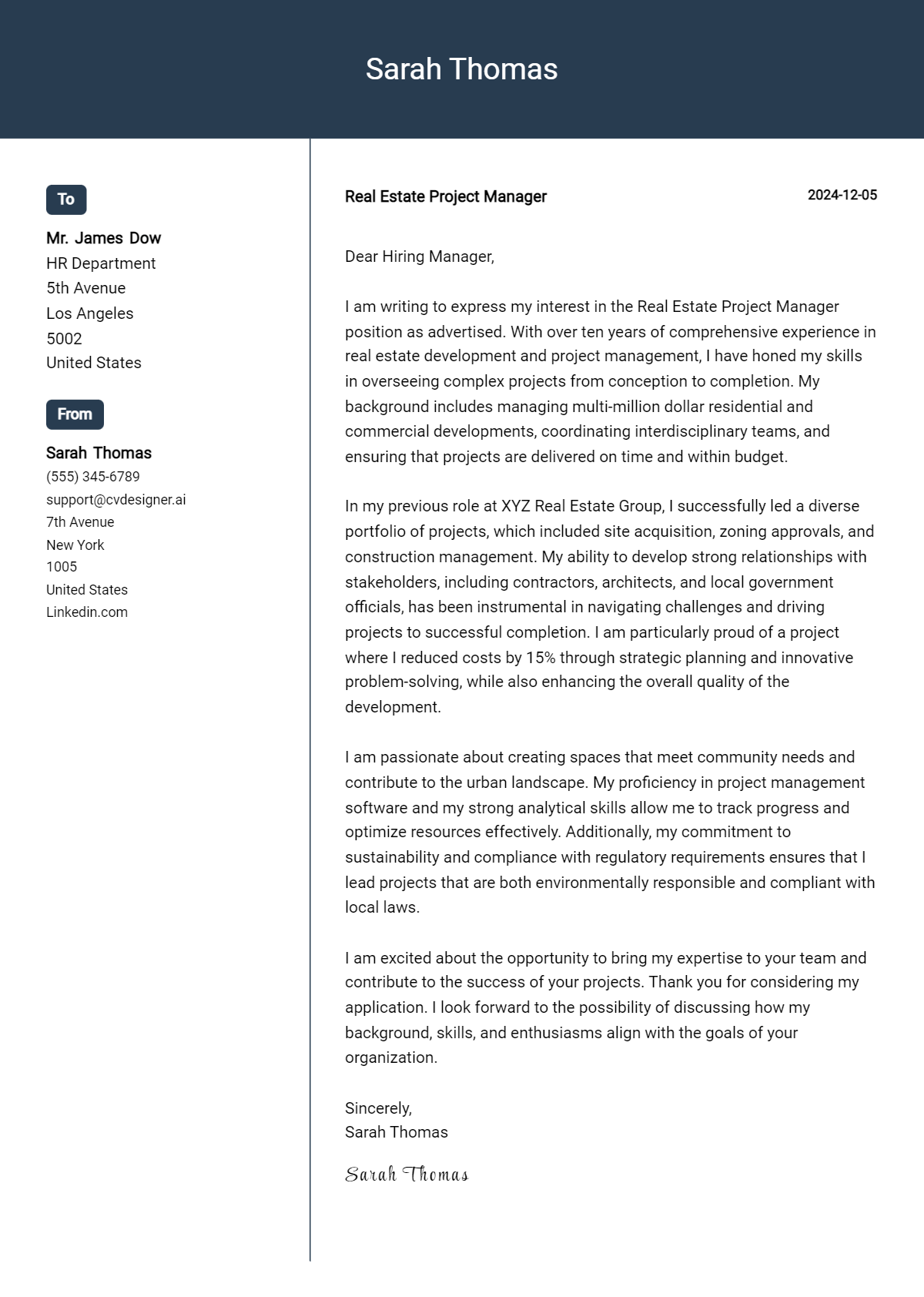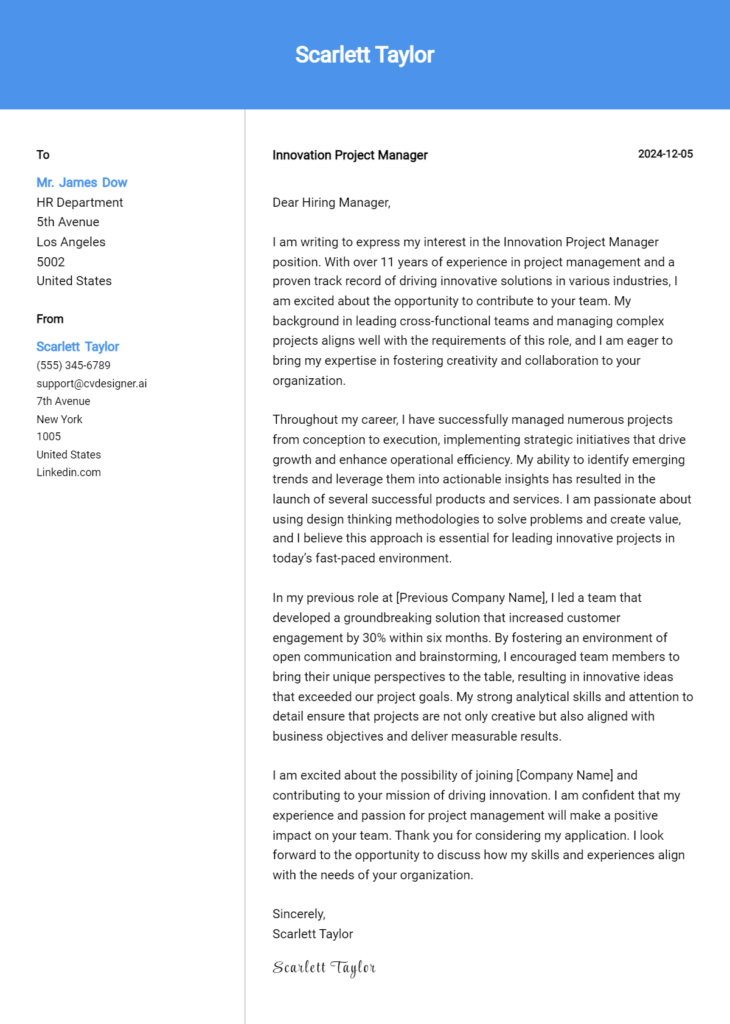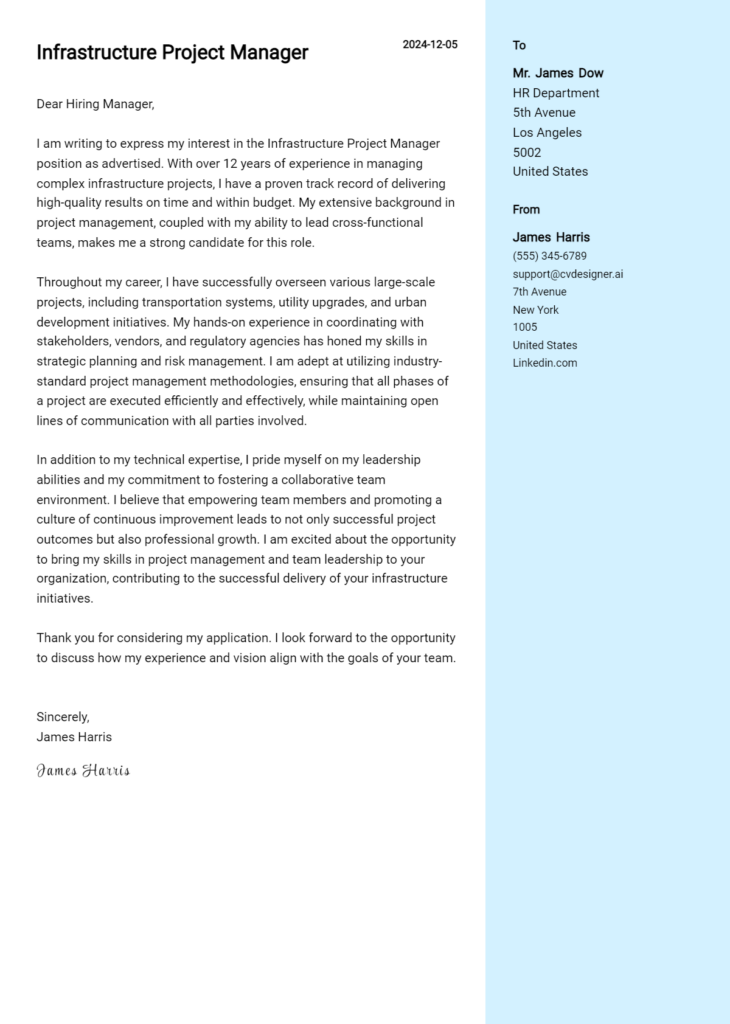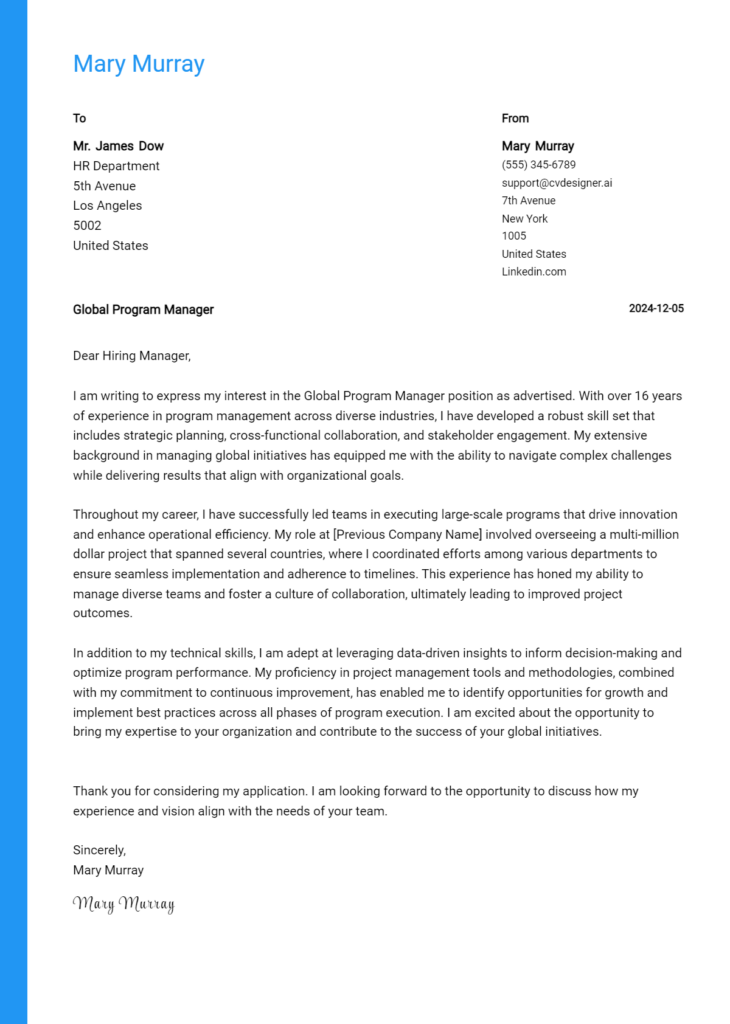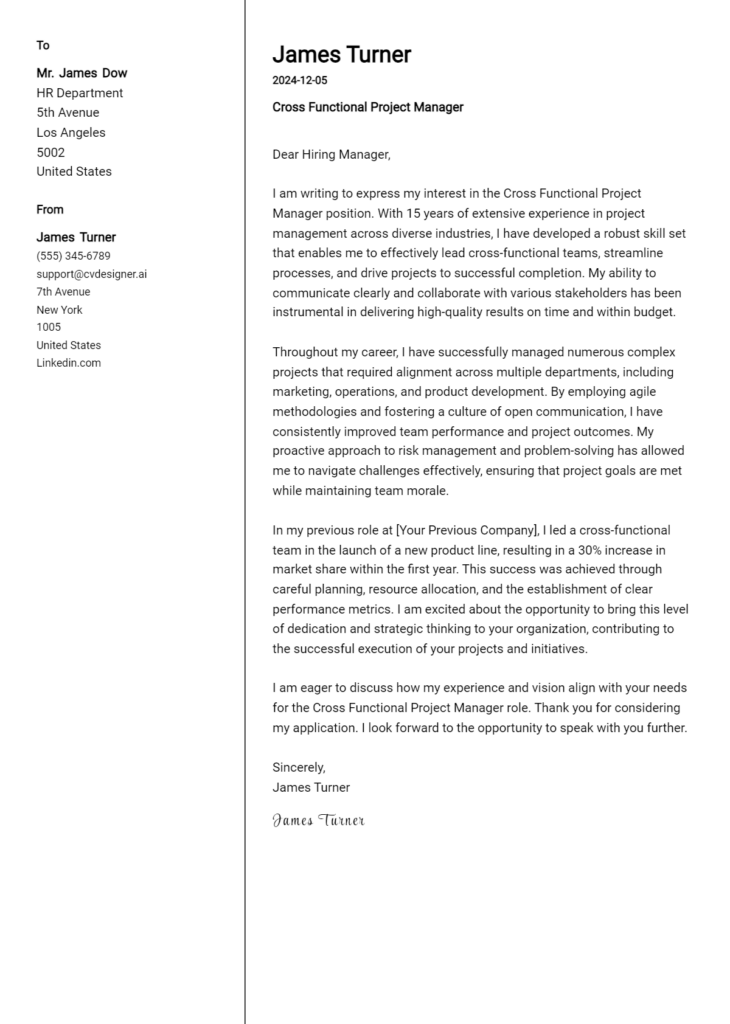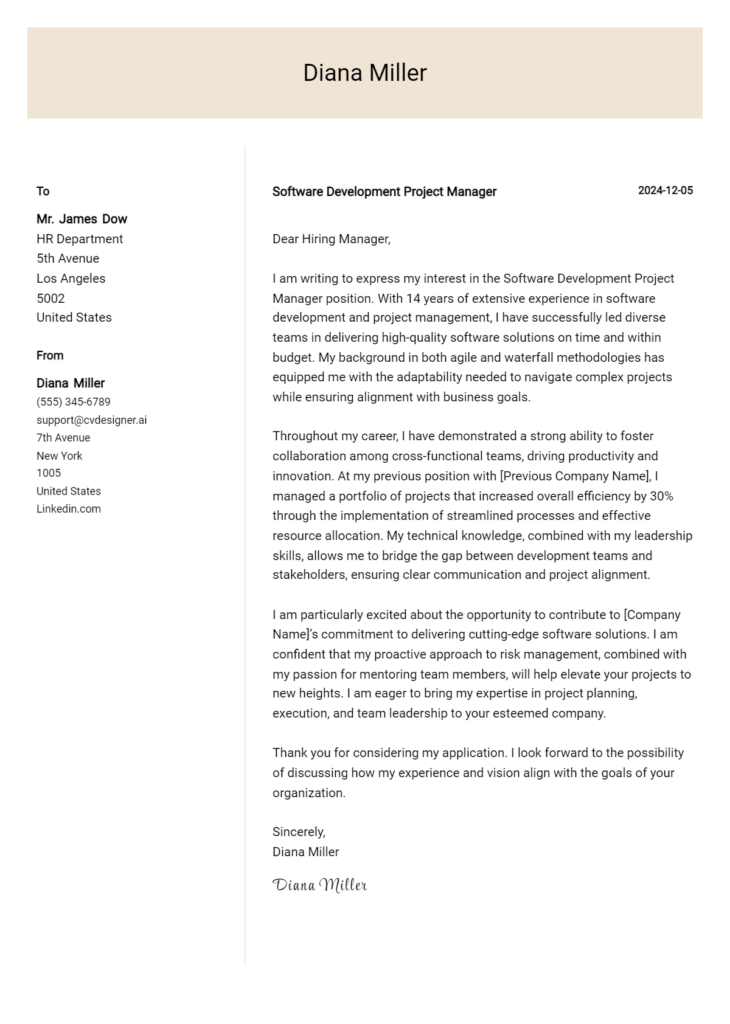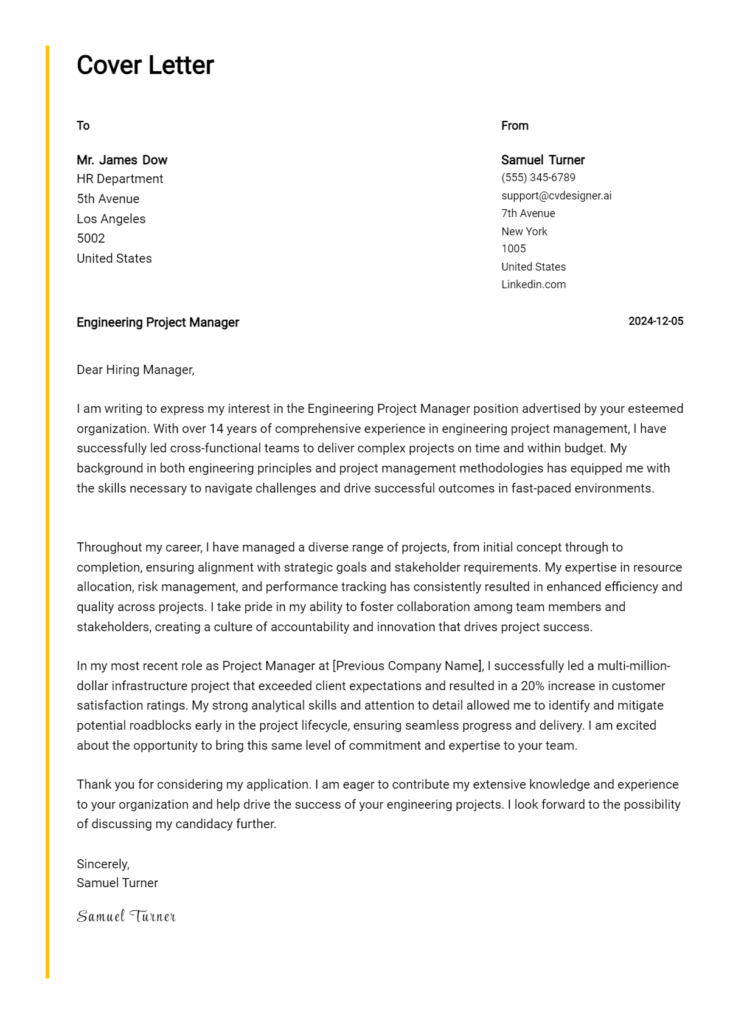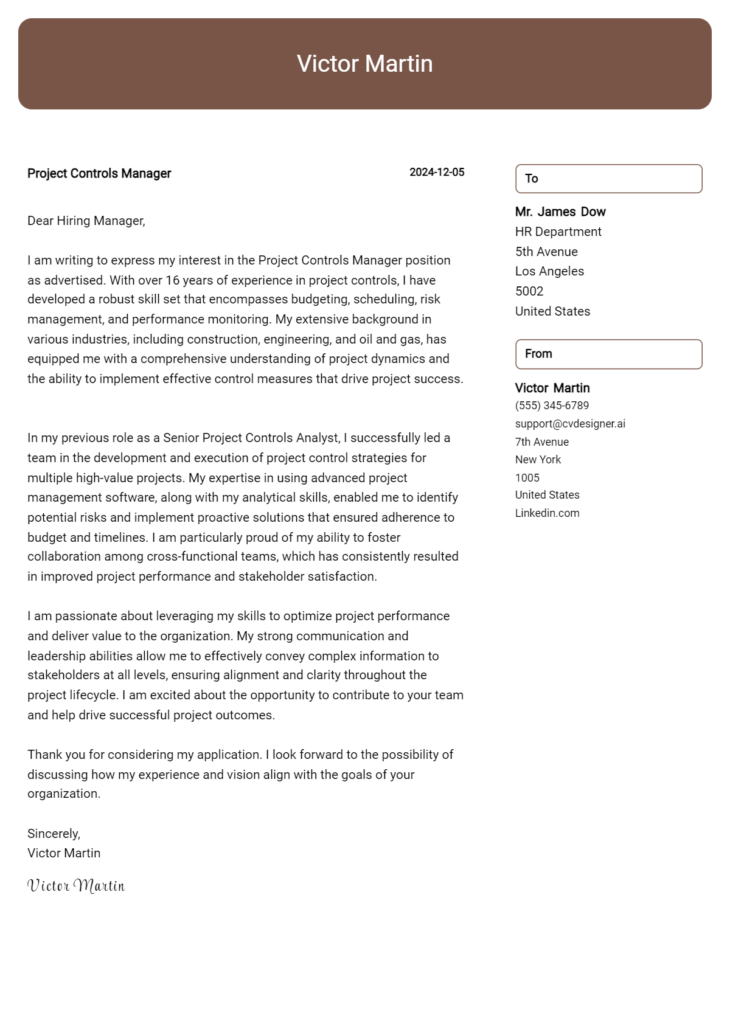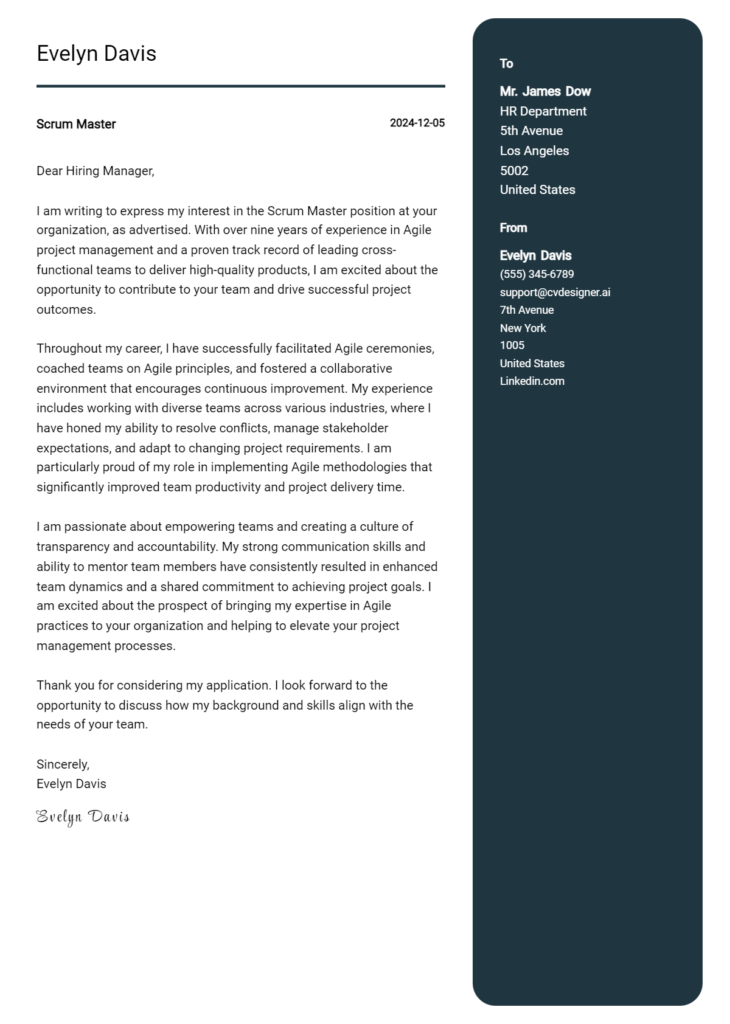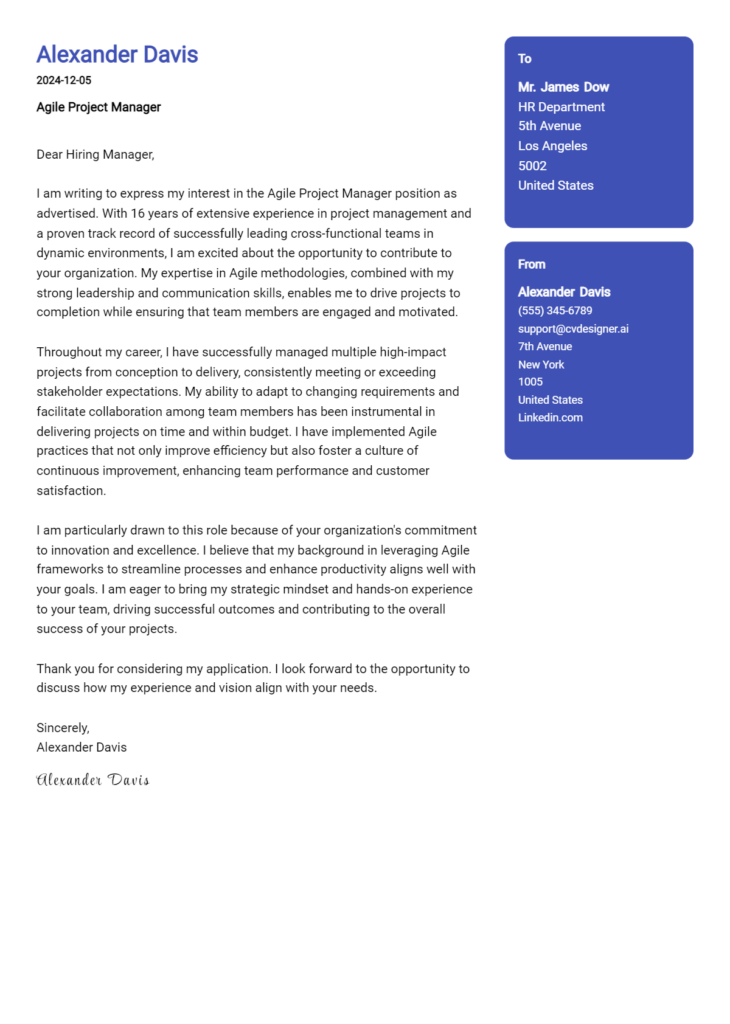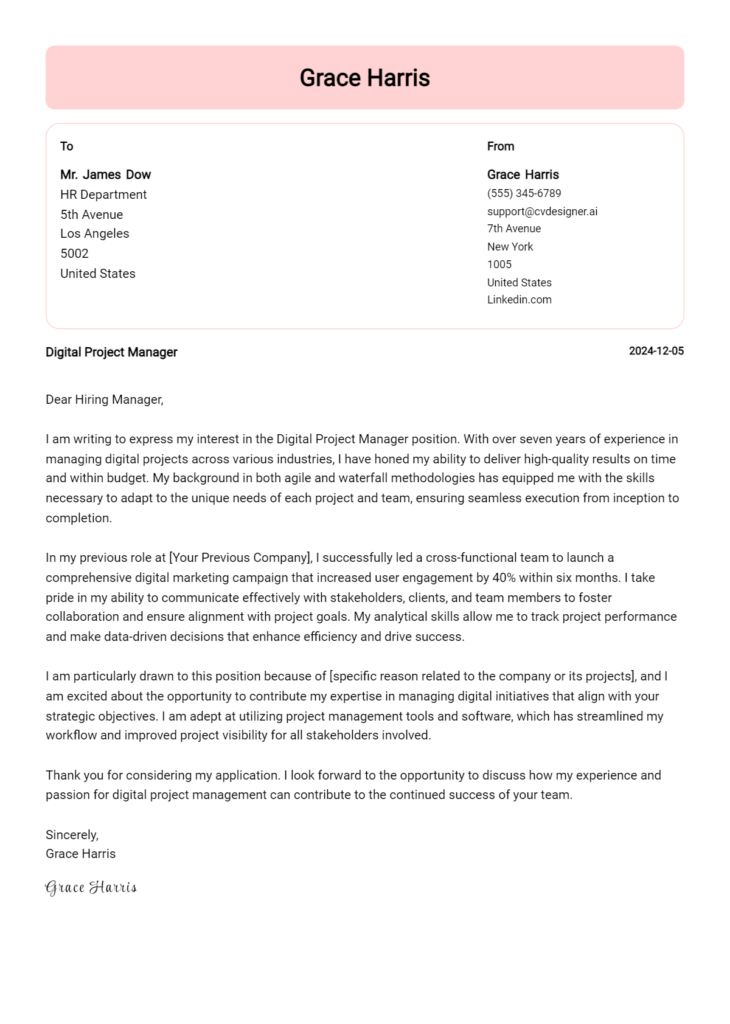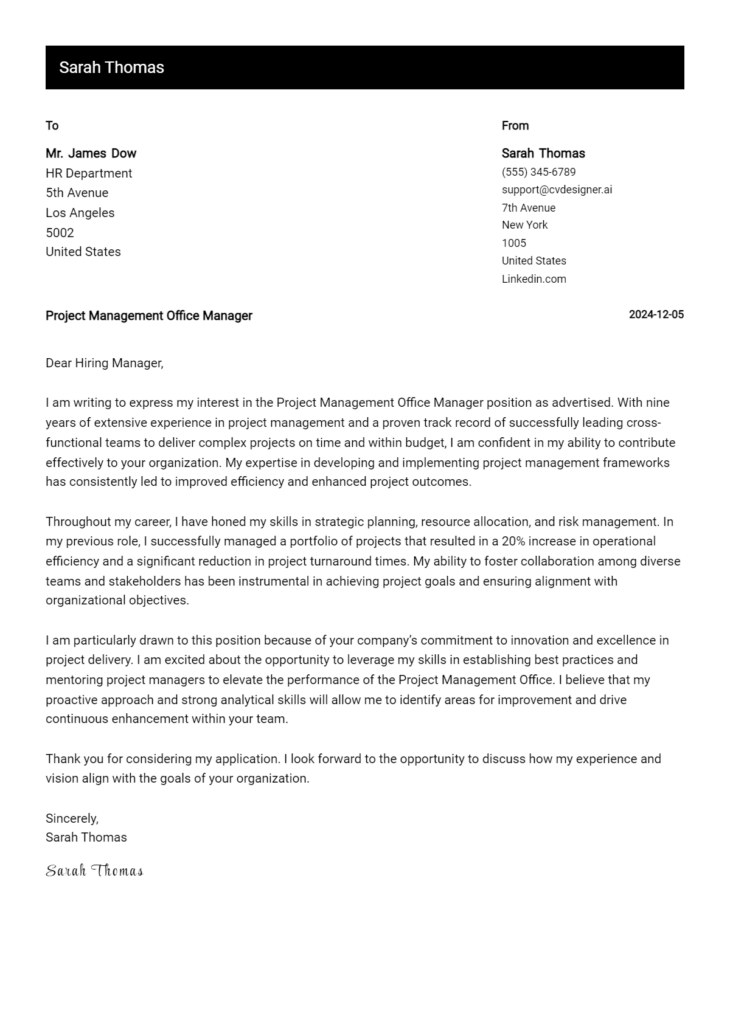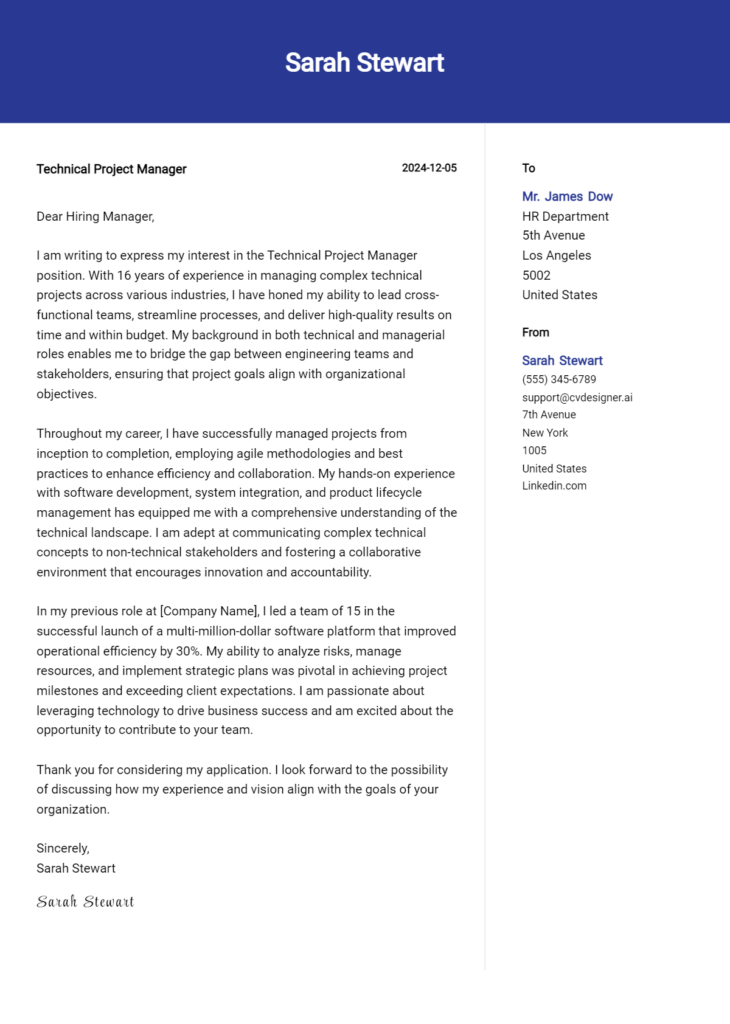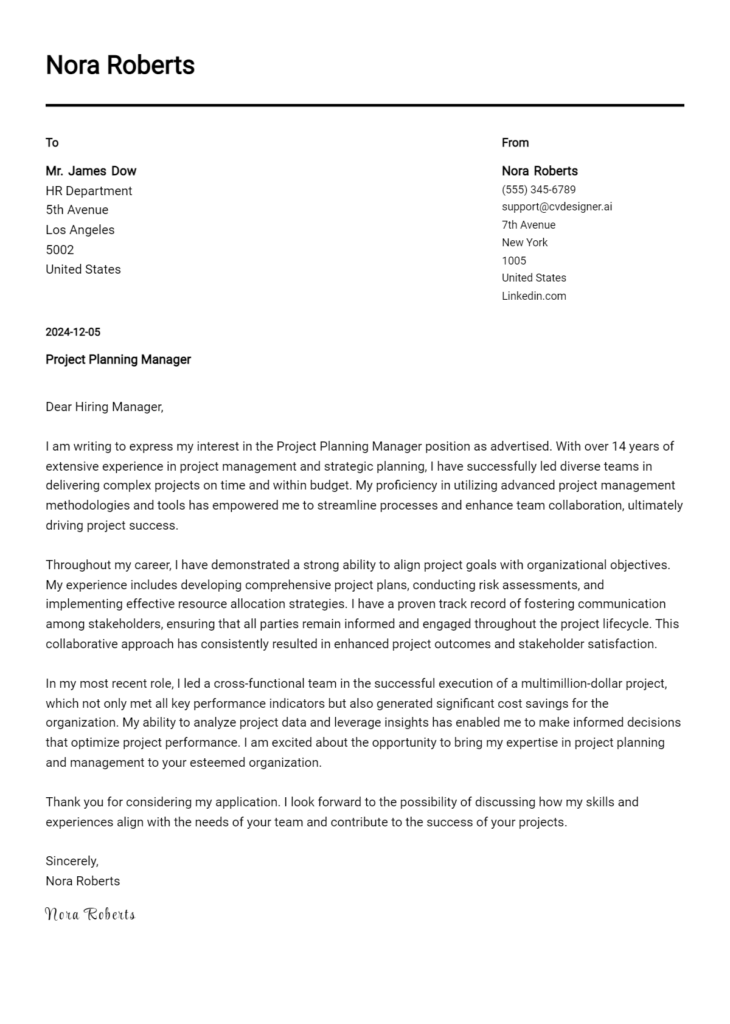Real Estate Project Manager Cover Letter Examples
Explore additional Real Estate Project Manager cover letter samples and guides and see what works for your level of experience or role.
How to Format a Real Estate Project Manager Cover Letter?
Crafting a compelling cover letter is essential for a Real Estate Project Manager, as it not only highlights your qualifications but also showcases your organizational skills and project management acumen. The way you format your cover letter can make a significant difference in capturing the hiring manager's attention. A well-structured cover letter reflects your ability to manage complex projects and communicate effectively—vital traits in the real estate industry.
In this guide, we'll explore how to format your cover letter, providing insights and real estate-specific examples to help you create a strong document.
We'll focus on the key components of a professional cover letter, including:
- Cover Letter Header
- Cover Letter Greeting
- Cover Letter Introduction
- Cover Letter Body
- Cover Letter Closing
Each section is crucial in presenting your qualifications and professionalism. Let’s break down each part and discuss how to make your Real Estate Project Manager cover letter shine.
The Importance of a Cover Letter Header for a Real Estate Project Manager
A well-crafted cover letter header is crucial for a Real Estate Project Manager as it establishes professionalism and sets the tone for the entire application. The header should include essential information such as your contact details (name, address, phone number, and email), the date, and the recipient's information (name, title, company, and address). Clarity and professionalism in this section are vital, as they help create a positive first impression and ensure that your application is taken seriously.
Strong Example
John Smith 123 Main Street Cityville, ST 12345 (123) 456-7890 john.smith@email.com October 15, 2023 Jane Doe Hiring Manager ABC Real Estate Company 456 Park Avenue Cityville, ST 12345
Weak Example
J. Smith 123 Main Cityville October 15, 2023 ABC Company
The Importance of a Strong Cover Letter Greeting
The greeting of a cover letter is crucial as it sets the tone for the entire correspondence. A well-crafted greeting not only demonstrates professionalism but also personalizes the message by addressing the hiring manager directly. This initial engagement can create a positive impression and establish a connection with the reader. To ensure your greeting resonates, avoid generic phrases like "To Whom It May Concern." Instead, take the time to research the recipient's name, which shows your commitment to the application and attention to detail. A personalized greeting can enhance the overall effectiveness of your cover letter, making it more memorable and impactful.
Strong Greeting Example
Dear Ms. Johnson,
Weak Greeting Example
To Whom It May Concern,
The Importance of an Engaging Cover Letter Introduction for a Real Estate Project Manager
A well-crafted cover letter introduction is crucial for a Real Estate Project Manager, as it serves as the first impression for the hiring manager. This introduction should not only capture their attention but also convey the candidate’s genuine interest in the role. Additionally, it should highlight key skills or achievements that align with the job requirements, setting the tone for the rest of the cover letter. A strong introduction can differentiate a candidate from the competition, showcasing their unique qualifications and enthusiasm for the position.
Strong Example
Dear [Hiring Manager's Name], As a seasoned Real Estate Project Manager with over eight years of experience in successfully overseeing high-profile commercial developments, I was thrilled to discover the opportunity at [Company Name]. My track record of delivering projects on time and within budget, combined with my passion for sustainable development, positions me uniquely to contribute to your team. I am eager to bring my expertise in stakeholder engagement and strategic planning to drive innovative solutions for your upcoming projects.
Weak Example
To Whom It May Concern, I am writing to apply for the Real Estate Project Manager position. I have some experience in project management and I think I would be a good fit. I have worked on a few projects in the past and I hope to bring my skills to your company.
Purpose of the Cover Letter Body for a Real Estate Project Manager
The cover letter body for a Real Estate Project Manager serves as a critical component in the job application process, providing candidates the opportunity to highlight their relevant skills, experiences, and the unique value they bring to the company. This section allows applicants to showcase specific projects they have managed, emphasizing accomplishments such as successful project completions, budget management, team leadership, and stakeholder engagement. By articulating these experiences, candidates can effectively demonstrate their ability to oversee complex real estate projects, ensuring they meet deadlines and stay within budget while maintaining high-quality standards.
Strong Example
Dear Hiring Manager, I am excited to apply for the Real Estate Project Manager position at XYZ Realty. With over seven years of experience in the real estate industry, I have successfully managed multiple large-scale projects, including the $10 million Greenview Apartments development, where I led a cross-functional team to deliver the project two months ahead of schedule and 5% under budget. My expertise in stakeholder management and negotiation allowed me to secure favorable contracts with vendors, which contributed to significant cost savings. I am eager to bring my proven track record of success and my passion for real estate to your esteemed company, helping XYZ Realty achieve its ambitious project goals. Sincerely, John Doe
Weak Example
Dear Hiring Manager, I am interested in the Real Estate Project Manager position. I have worked in real estate for a few years and have managed some projects. I think I could do well in this role. I am good at working with people and can manage tasks. I hope to help your company with its projects. Best, Jane Smith
Importance of the Cover Letter Closing for a Real Estate Project Manager
The closing paragraph of a cover letter is a crucial component, especially for a Real Estate Project Manager. It serves as the final opportunity to summarize your qualifications, reiterate your enthusiasm for the role, and encourage the employer to take the next step in the hiring process. A strong closing leaves a lasting impression and demonstrates your professionalism and commitment to the position, while a weak closing can diminish the impact of your entire application.
Strong Example
Thank you for considering my application for the Real Estate Project Manager position. With over five years of experience leading diverse projects and a proven track record of delivering results on time and within budget, I am eager to bring my expertise to your esteemed firm. I am genuinely excited about the opportunity to contribute to your team and would welcome the chance to discuss my candidacy further. I look forward to the possibility of scheduling an interview to explore how I can help drive your projects to success.
Weak Example
Thanks for reading my letter. I hope you look at my resume. It would be nice to talk if you want, but no pressure.
Crafting an effective cover letter for a Real Estate Project Manager position is crucial to making a strong first impression on potential employers. Your cover letter should not only highlight your experience and qualifications but also demonstrate your technical skills, problem-solving abilities, and knowledge of the Software Development Life Cycle (SDLC). Additionally, showcasing your teamwork skills and passion for continuous learning will set you apart from other candidates. Here are some tips to help you create a compelling cover letter that captures the essence of your expertise in the real estate industry.
Tips for Writing a Cover Letter for Real Estate Project Manager
Highlight Your Technical Skills
Clearly outline your technical skills relevant to real estate project management. Mention specific software tools and technologies you are proficient in, such as project management software, CAD tools, or property management systems. This showcases your ability to leverage technology effectively in managing projects.Emphasize Problem-Solving Abilities
Provide examples of challenges you have faced in previous projects and how you successfully resolved them. Employers are looking for candidates who can think critically and navigate obstacles efficiently. Use metrics or results to quantify your achievements, making your problem-solving capabilities tangible.Showcase Your Knowledge of SDLC
If your role involves aspects of software development—especially for real estate tech solutions—demonstrate your understanding of the Software Development Life Cycle. Discuss your experience in planning, executing, and closing projects while ensuring quality deliverables at each stage of the SDLC.Demonstrate Teamwork and Collaboration
Real estate projects often require collaboration with various stakeholders, including developers, contractors, and clients. Highlight your experience working in teams, emphasizing your ability to communicate effectively and foster a collaborative environment. Mention any successful partnerships that led to project success.Express Your Passion for Continuous Learning
The real estate industry is constantly evolving, and showing your commitment to staying updated with the latest trends and technologies can impress potential employers. Mention any relevant certifications, courses, or conferences you have attended. This illustrates your proactive approach to professional development and your dedication to excellence in your field.
By following these tips, candidates can create a standout cover letter that effectively showcases their qualifications for a Real Estate Project Manager role. For more assistance, consider using cover letter templates or a cover letter builder to streamline the writing process.
Common Mistakes to Avoid in a Real Estate Project Manager Cover Letter
Crafting an effective cover letter is vital for standing out in the competitive field of real estate project management. Avoiding common mistakes can significantly enhance your chances of making a positive impression. Here are some pitfalls to steer clear of:
Generic Content: Failing to tailor your cover letter to the specific job can make it seem impersonal. Always customize your letter to reflect the job description and the company's values.
Neglecting Formatting: A poorly formatted cover letter can detract from your message. Ensure you follow a professional cover letter format that is easy to read and visually appealing.
Ignoring the Employer's Needs: Many candidates focus solely on their qualifications rather than addressing how they can meet the employer's needs. Make sure to highlight how your skills align with the company's goals.
Overly Formal Language: Using overly formal or complex language can make your letter sound stiff. Aim for a professional yet conversational tone that reflects your personality.
Being Too Vague: Failing to provide specific examples of your accomplishments can weaken your application. Use quantifiable achievements to demonstrate your impact in previous roles.
Not Proofreading: Spelling and grammatical errors can undermine your professionalism. Always proofread your cover letter or have someone else review it to catch any mistakes.
Lengthy Content: A lengthy cover letter can lose the reader's interest. Aim for a concise, engaging letter that effectively summarizes your qualifications in a few paragraphs.
By avoiding these common mistakes, you can create a compelling cover letter that enhances your application. For inspiration, refer to various cover letter examples to see what works best for your target role.
Cover Letter FAQs for Real Estate Project Manager
What should I include in my cover letter for a Real Estate Project Manager position?
In your cover letter, emphasize your relevant experience in managing real estate projects, including specific examples of successful projects you've led. Highlight your skills in budgeting, scheduling, and team collaboration. Mention your knowledge of real estate market trends and regulations, as well as any certifications you hold, like Project Management Professional (PMP) or a real estate license. Additionally, express your passion for real estate development and how your values align with the company’s mission. Tailor the letter to the specific job description, focusing on the key qualifications the employer is seeking.
How can I demonstrate my leadership skills in a cover letter?
To showcase your leadership skills in your cover letter, provide concrete examples of how you've effectively managed teams and projects. Describe situations where you resolved conflicts, motivated team members, or navigated complex challenges. Use metrics to quantify your success, such as the percentage of projects completed on time or under budget. Highlight your communication skills and ability to liaise with stakeholders, including clients, contractors, and regulatory agencies. This not only illustrates your leadership capabilities but also your capacity to drive projects toward successful completion.
Should I customize my cover letter for each application?
Yes, customizing your cover letter for each application is crucial. Employers can easily spot generic letters, which may lead them to question your interest in the position. Tailor your cover letter by addressing the specific requirements mentioned in the job description. Use the company's name and refer to their unique projects or values to demonstrate your knowledge and enthusiasm. Highlight experiences that directly relate to the role and show how your skills can benefit the company. This personalized approach increases your chances of standing out among other candidates.
How long should my cover letter be for a Real Estate Project Manager role?
Your cover letter should ideally be one page long, typically between 250 to 400 words. This length allows you to convey your qualifications and enthusiasm without overwhelming the reader. Start with a strong introduction that grabs attention, followed by a few concise paragraphs detailing your relevant experience, skills, and achievements. Conclude with a compelling closing statement that reiterates your interest in the position and invites further discussion. Remember to be clear and professional, ensuring that every word adds value to your application.
Build your Cover Letter in minutes
Use an AI-powered cover letter builder and have your letter done in 5 minutes. Just select your template and our software will guide you through the process.

